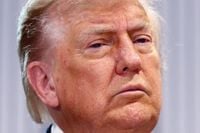On Monday, June 16, 2025, U.S. President Donald Trump made a dramatic early exit from the Group of Seven (G7) summit in Canada, cutting short his participation amid escalating tensions in the Middle East. The decision came as Israel intensified its aerial bombardment campaign against Iran's military infrastructure, signaling a volatile turn in the region’s already fraught geopolitical landscape.
Trump's departure was officially announced by White House press secretary Karoline Leavitt, who stated that the president was leaving "because of what’s going on in the Middle East." According to Leavitt, "Much was accomplished, but because of what's going on in the Middle East, President Trump will be leaving tonight after dinner with Heads of State." His early exit meant skipping a series of crucial meetings scheduled for Tuesday, June 17, 2025, which were set to address the ongoing war in Ukraine and global trade issues, underscoring the gravity of the Middle East situation.
Prior to leaving, Trump issued a stark warning regarding Iran’s nuclear ambitions. Speaking at the summit, he emphasized the urgent need for Iran to curb its nuclear program before it is "too late." On social media platform Truth Social, he posted emphatically: "Iran should have signed the 'deal' I told them to sign. What a shame, and waste of human life. Simply stated, IRAN CAN NOT HAVE A NUCLEAR WEAPON. I said it over and over again! Everyone should immediately evacuate Tehran!" This message echoed his long-standing opposition to Iran acquiring nuclear weapons and his frustration with the current regime’s stance.
Trump’s call for immediate evacuation of Tehran was unprecedented in its urgency. The president’s direct appeal to civilians to leave Iran’s capital reflects the heightened concerns over potential military escalations following the recent Israeli strikes. These strikes, launched four days prior to Trump’s announcement, targeted key Iranian military sites, further destabilizing the region.
Upon deciding to leave the summit early, Trump also requested that the National Security Council (NSC) be convened in the Situation Room as he returned to Washington. This move was first reported by Lawrence Jones, co-host of Fox News’ "FOX & Friends," on the social media platform X, and later confirmed by a White House spokeswoman to CNN. The NSC’s readiness signifies the administration’s heightened alertness to the unfolding crisis and the need for coordinated security and diplomatic responses.
Trump’s meeting with Canadian Prime Minister Mark Carney at the Pomeroy Kananaskis Mountain Lodge in Alberta on the day of his departure marked one of his final official engagements at the summit. The G7 leaders had gathered in Canada with the aim of addressing a range of global challenges, including the war in Ukraine and economic issues, but the sudden intensification of conflict in the Middle East shifted the summit’s focus dramatically.
World leaders at the summit were confronted with the stark reality of Iran’s nuclear program and the potential for broader conflict. Trump’s insistence that Iran should have accepted the nuclear deal he had proposed highlights the ongoing diplomatic impasse. His critique underscores a broader international concern that failure to engage Iran constructively could lead to catastrophic consequences.
The Israeli strikes against Iran’s military infrastructure have added a new layer of complexity to the already tense relations between the two countries. Israel’s campaign, which began four days before Trump’s announcement, aims to degrade Iran’s military capabilities but risks provoking a larger regional confrontation. The United States, under Trump’s leadership, appears poised to respond swiftly to any escalation, as indicated by the activation of the National Security Council.
Trump’s early departure from the G7 summit and his urgent messages to evacuate Tehran reflect the administration’s prioritization of the Middle East crisis over other global issues. It also signals a potential shift in U.S. policy, emphasizing a more direct and immediate response to perceived threats from Iran’s nuclear ambitions.
The president’s actions and statements have sparked a flurry of reactions worldwide, with many watching closely to see how the situation will evolve. The coming days will be critical in determining whether diplomatic efforts can prevail or if the region is on the brink of a wider conflict.
As the world grapples with these developments, the focus remains on preventing further escalation and seeking pathways to peace. However, with the current trajectory, the risk of intensified confrontation looms large, making President Trump’s early exit from the G7 and his urgent calls all the more significant.
In the meantime, the National Security Council's convening in the Situation Room underscores the seriousness with which the U.S. government is treating the crisis, preparing to coordinate responses that could have far-reaching implications for global security.





